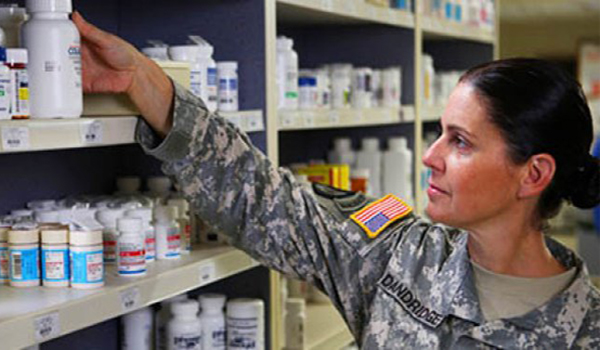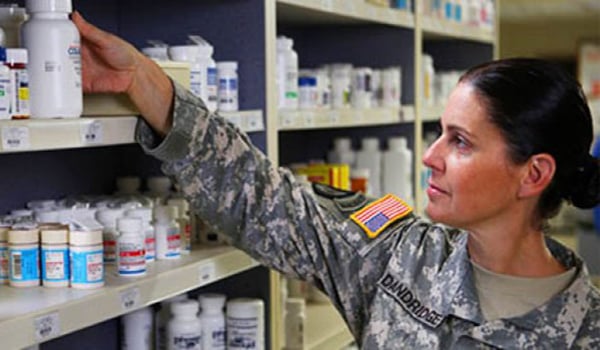
Ask the Flight Surgeon / By CPT Jessica Warneke, D.O.: Q: Doc, a lot of guys are getting a cold and have started taking over-the-counter (OTC) meds. Are we supposed to come in to see you if we are taking OTC medications?

Photo Credit: U.S. Army
FS: As an aircrew member, you operate in an environment that requires you to be more aware, focused, and healthy than the typical Army population. The environment in which you operate is very unforgiving and one small mistake or error can be fatal. If you become sick over the weekend and take an OTC medication, you should still come in to see the flight surgeon to get cleared to return to flying duties. Per the Aeromedical Policy Letters (APLs), the Class 1 Medications are allowed to be taken for a short time while flying, only if a flight surgeon is not immediately available. Even though you were able to treat yourself and felt fine, there are other things to be considered that the flight surgeon must evaluate. Several symptoms of the common cold can cause hazardous circumstances while in flight.
What cold medications are considered Over-The-Counter (OTC)?
OTC medications are any medications that you can buy in the pharmacy section of a department store that do not require a prescription. Some examples would include Tylenol (acetaminophen), Motrin (ibuprofen), Sudafed (pseudoephedrine), Halls lozenges (menthol), Mucinex (guaifenesin), Robitussin (dextromethorphan), Allegra (fexofenadine), Claritin (loratadine), Aspirin (acetylsalicyclic acid), and Chloraseptic Spray (phenol spray). This list is not all-inclusive, but they are the most commonly used medications to treat cold symptoms. Furthermore, remember that some OTC medications are combination medications. For example, Mucinex DM is a combination of guaifenesin and dextromethorphan. Tylenol Cold & Flu has four medications: acetaminophen, dextromethorphan, guaifenesin, and phenylephrine.
Why do I need to tell my flight surgeon about the OTC meds I took?
Always abide by AR 40-8, which discusses the instances in which an aircrew member must notify a flight surgeon of any changes in their health such as the following: recent procedures requiring anesthesia (local or general), medication use, blood donation, alcohol use, amongst other exposures to exogenous factors. Additionally, just because medications are OTC does not mean they are free from side effects. Even if you have taken them in the past without side effects, it does not mean you will not develop them in the future. Appropriately reporting your health issues and medications is not only a good idea for your health and safety, but it is also required by Army Regulation.
Do I really need to go in to sick call to be seen for a cough?
Let’s start with one of the most common complaints: the cough. There are many different causes of a cough such as post nasal drip, allergies, viral infections, and pneumonia. Depending on the time of year, some causes may be more prevalent than others. OTC medications like dextromethorphan can cause side effects such as drowsiness, dizziness, headache, nausea and vomiting. These symptoms are not compatible with being an effective aircrew member.
Another reason to be evaluated for the cough is to ensure you are not missing a potentially dangerous condition that will impair your body’s physiologic responses at altitude. Your lungs allow for the transfer of oxygen into the blood stream to supply your tissues. In cases such as pneumonia, the amount of oxygen that gets into the blood stream can be reduced which is exacerbated while flying at altitude. When you have pneumonia while flying at altitude, you are now even more susceptible to becoming hypoxic than a healthy individual. Your situation is exacerbated if you smoke cigarettes because you are inhaling carbon monoxide in small amounts with each puff. Normally these small amounts would not affect you acutely. However, if you factor in pneumonia while flying at altitude, it could cause a detrimental impact to your body’s oxygen supply. Once your brain begins to be deprived of oxygen, you can start to develop hypoxic symptoms. Hypoxia leads to reduced visual function, mental impairment, and altered level of consciousness. You do not want to experience these deficits while flying.
As you can see, a lot of different factors must be taken into account when determining the cause of a symptom and whether an air crewmember is safe to continue flying. Most OTC medications are safe to take and fly, but you should always talk with your flight surgeon before flying to get further instructions.
Questions?
If you have a question you would like addressed, email it to This email address is being protected from spambots. You need JavaScript enabled to view it.; we’ll try to address it in the future. See your unit flight surgeon for your personal health issues. The views and opinions offered are those of the author and researchers and should not be construed as an official Department of the Army position unless otherwise stated.
CPT (Dr.) Jessica Warneke is a flight surgeon at the School of Army Aviation Medicine, Fort Rucker, AL.
























